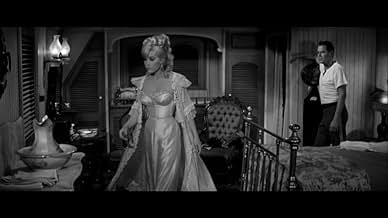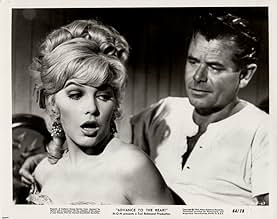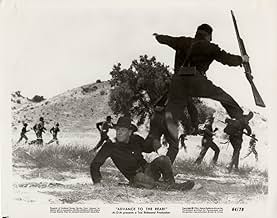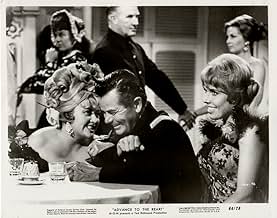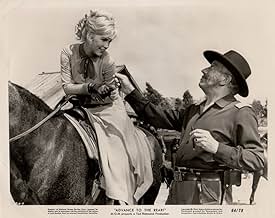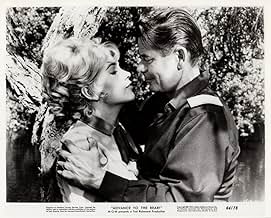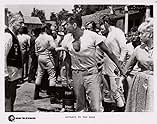Füge eine Handlung in deiner Sprache hinzuWhen A Union Army outfit of misfits and rejects is sent to the Western territory, Southern spies try to figure out what they're doing there.When A Union Army outfit of misfits and rejects is sent to the Western territory, Southern spies try to figure out what they're doing there.When A Union Army outfit of misfits and rejects is sent to the Western territory, Southern spies try to figure out what they're doing there.
- Sergeant Davis
- (as Alan Hale)
- Courier
- (Nicht genannt)
- Waiter
- (Nicht genannt)
- Steamboat Captain
- (Nicht genannt)
- Member of the Law & Order League
- (Nicht genannt)
- Trooper
- (Nicht genannt)
Empfohlene Bewertungen
"Advance to the Rear" is a funny movie. It made me laugh. There you have it. That's my review. Part of me feels that this movie shouldn't work. It's a total contrivance. But it's so feather-light, so airy, so unpretentious, and so good-natured that one just gives in to it. It's as if the film-makers and the actors are saying: "We've put together this little concoction for your amusement, and we hope that you have a good time." It helps that Glenn Ford and Melvyn Douglas are the stars - Ford taking things way too seriously and becoming seriously undone, and Douglas, demoted to Captain, wincing at every mishap and quite beside himself about what his wife will think ("I married well! All my friends are generals!"). Even if you don't think that men running around in their long-johns is funny you might get a hoot out of the injun from West Point, the guy whose scent attracts horses and the ski attack on water barrel rings. As for Stella Stevens - she can be the angel on top of my Christmas tree anytime.
I am going to have to track this down and plant it near THE HALLELUJAH TRAIL (another good comedy set in the same time period) on my viewing shelf.
During the last days of the Civil War, a contingent of Union soldiers, have made an uneasy accommodation with their Confederate counterparts stationed a few miles away. Every day at a certain time, each side fires a round of cannon fire at the other, timed to a deliberate miss. The aim of both sides is to, hopefully, last out the war in this manner: reasonably safe and secure.
This arrangement works quite well, until a brash headstrong Union Captain (played well by Glenn Ford)decides,on his own, to go out and capture a few of the "enemy". This of course forces their equally reluctant "enemy" to retaliate.
Ford's Commander,(played with exquisite timing by veteran actor Melvyn Douglas) is horrified. "What have you done?" he shouts at him, "take them back! How many times have I instructed you not to show initiative?" From this point on, the humor escalates and never ceases.
Staffed by some of the most recognized character actors of the time, we are treated to a highly skilled portrayal of an incredibly believable assortment of military misfits. What makes them believable is that their characterizations are delivered with depth. And this, in a sense, makes them somewhat realistic and all the more funnier.
This high caliber B-film is well scripted and, to it's credit, is finally being recognized for the cinematic gem that it is. My advice to all film lovers is to seek out this almost forgotten treasure. Trust me, you won't be disappointed.
Technically, the book was a historical novel, centred around the fictional character of Jared Heath, himself a disgraced Union officer, busted to sergeant, who was detailed to take charge of a company of other disgraced officers who had also been demoted for crimes such as desertion, disobedience, brawling and other such offences that are not tolerated in any Army, past or present. The end of the novel describes how Jared Heath and his "Company of Cowards" manage to redeem themselves during a heroic battle against Comanche and the Kiowa Indians, with a few of them giving their own lives in the heat of battle.
I should imagine that the producers and MGM had a lot of debate about how this film should be made. Was it to be a film about the true horrors of war and how disgraced soldiers were treated by the other troopers, as depicted in the novel? No, it was to be made as a knockabout comedy, directed by George Marshall, who had already directed James Stewart in "Destry Rides Again" and Glen Ford in a few other films, such as another comedy western, "The Sheepman".
A question had already asked as to whether the television comedy series, "F Troop" was loosely based on this film. Well, as the series was released on ABC a year later, it is probably more than a coincidence that the producers of the series did take some inspiration from this film. Ken Berry would have been a more naïve version of the Glen Ford character.
Jack Schaefer's novel was a very serious study on how the American Civil War was fought, which went on to describe the horror of fighting in the Indians Wars, when many hostile Indian tribes took advantage of the fact that the "white men" were distracted with fighting each other.
There were also some political comments about why the Union government kept changing its mind as to the reason for the war, starting out with political wrangles about why the Federal Government should have control over the distant Southern States; with the economic disparity between the Southern States and the Northern States; the need to keep the Union together; and, finally, the Abolition of Slavery.
Jack Schaefer wrote "Shane", one of the greatest and most realistic westerns ever written and filmed - I wonder what he thought of how his original novel was brought to the screen.
I will give the film 8 out of 10 for the lively performances of Glen Ford and the lovely Stella Stevens.
It's not hard to fall into liking this easy-going and ramshackle comedy, which switches easily from knockabout physical humour (with 'assorted' sound effects) to silly dialogue and a general feel that the assorted misfits of this Union regiment just aren't taking their roles that seriously. The story, for what it is has the regiment being sent out of reach of action but still manage to capture a rebel spy, played by Stella Stevens and they all end up in a heap of trouble. A $2 million gold bullion gets in the mix as do some rather "friendly" Indians.
Glenn Ford is easily the most recognisable as the captain and Melvyn Douglas as the Colonel "in charge" and these two string it all together and he's not bad at comic timing or deadpan delivery. He has a romantic fling with Stevens, as all the regiment do (in their dreams!) Destry Rides Again director George Stevens' film is in widescreen and (here) an attractively dark-greened tinged black & white and which runs for 96mins.
The comedy is gentle and clever rather than broad, or crude and the targets are fairly obvious but as it's all fairly sweet it's all a nicely pleasurable watch rather than anything classic or downright hilarious - though the scene where they storm the camp, dressed in long-johns, with boards on their feet down the dry grass slopes, to the soundtrack of a WW2 fighter plane battle is actually really rather humorous!
Wusstest du schon
- WissenswertesThe steamboat used in this movie was originally built and used as the Cotton Blossom, in MGM's Mississippi-Melodie (1951). It was also used in Das Land des Regenbaums (1957) and Abenteuer am Mississippi (1960). In the 1970s, it was one of the props auctioned off by the studio.
- PatzerIn the scenes where the cannons fire 30 rounds, some of the cannons fire before their fuses are ignited.
- Zitate
Martha Lou: All right. Let's say, just for the moment, that I *am* a spy.
Heath: A very pretty one, too.
Martha Lou: That would make us enemies, Jared.
Heath: Yeah, of course it would. And, we'd be starting out at a point in marriage that takes some couples twenty or thirty years to achieve!
Top-Auswahl
- How long is Advance to the Rear?Powered by Alexa
Details
- Laufzeit
- 1 Std. 40 Min.(100 min)
- Farbe
- Seitenverhältnis
- 2.35 : 1


